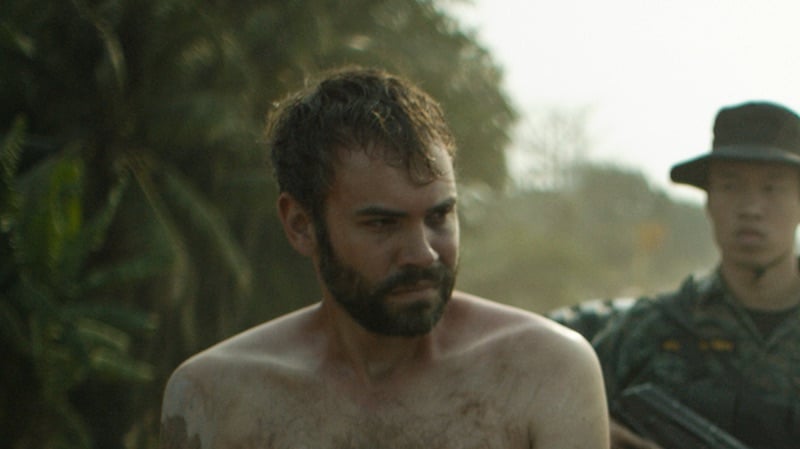
This is Rossif Sutherland’s big weekend. River opens today, in which he does impressive work under difficult circumstances as John Lake, a doctor on the lam in Laos after accidentally killing a man.
And on Saturday night, Sutherland could be named Best Leading Actor for his work in River at the Canadian Oscars – the Canadian Screen Awards.
The son of Donald Sutherland and half-brother to Keifer, Sutherland’s career star has risen steadily over the past few years with a sweet boost in Paul Gross’s 2015 war drama Hyena Road.
River asks a lot of Sutherland. He must put us in an identifiably frightening spot, running to escape certain harsh justice in the Laotian communist dictatorship.
Lake literally runs in blistering heat in this unknown territory searching for a way out. It’s all about the tension.
We had the chance to speak with Sutherland, who told us he never dropped character for the duration of the shoot, as well as writer director Jamie M. Dagg.
Watch the trailer for River
Monsters and Critics: Rossif you are nominated for a Best Actor Canadian Screen nom for your amazing performance. We are on high alert, right beside John Lake during the film. How did you get into character when it was time to shoot?
Rossif Sutherland: This was a production on the go, on the run, with a very small crew and in many ways the experience of shooting the film was similar to what my character was going through.
Things moved so fast and I had to adapt in the moment. Days were planned with room for the unexpected. And when we weren’t shooting, I never left the character so the anxiety and stress was constantly there.
I had anxiety that I had to carry the film and that we had to finish our days having done all the things my director wanted for the story.
There was anxiety throughout. I only had to amp it up not play it up. It was an experience like no other for me. I’m usually the actor on set, hired to be an expert at my character and the rest of the time stay out of people’s way.
But this was a group effort and we had our hands deep in the mud, all for the sake of making as good a film as we could. And we came home friends, which was a gift.

M&C: And then there was the physical nature of the work, the running, the physical tension, the heat. I’m not sure I’d want to swim across the Mekong River.
RS: Well I didn’t swim across the entire river, that’s the magic of movie making. But swimming across the Mekong River was the scene we were most worried about.
I equate it in film to sex scenes where you have to get naked and do the motions with a complete stranger and act in love – and usually it’s the scene everybody is anxious to get done and over.
M&C: Jamie, where did this story come from? Have you been to that area, or heard stories or did you just make it up?
Jamie M. Dagg: I’m sure there have been people in similar circumstances. It’s not based on anything. I’ve spent a lot of time in Laos. Years ago I was thinking about somebody, a character that sets out to do something good and there is a negative unexpected consequence.
Of the myriad decisions we make on a daily basis if we make one miscalculation your life can spin out of control. It’s fascinating that we are not that far removed from the animal kingdom; we have this capacity for violence within us.
In North America we live in a relatively safe society and most people have food and shelter. It keeps us civilised, but in a perfect storm of circumstances, that violence can surface.

M&C: River was incredibly ambitious considering the location and physical difficulty.
JMD: Traveling to Laos is simple. It’s totally open to the west but it’s a challenging place to shoot. It’s a communist dictatorship and they don’t have any film infrastructure.
Luckily for us the film is apolitical, not criticising the government. So they were open to us shooting there. Originally I thought maybe I’ll just sneak in there guerilla style under the radar, very quickly, but very soon I realised we’d have to do it with support of the government and their script approval, getting permission to scout every district and then again when you’re shooting.
They assign you government minders and I was paranoid about how dangerous the area was. Especially in the south, the police were helping us. A village chief came out to visit us and the people were lovely and accepting.

There was an incident when we were shut down by thugs in a truck with guns. We were shooting a chase scene. The government found out we were shut down and the Ministry of Security announced that no one was to get in our way.
It was challenging. During one shoot the crowds of people were watching Rossif, this tall guy in a land of relatively short people, running – and they were running.
So when I’m asked for advice on making your first film I say, “Don’t shoot in a communist dictatorship with a film infrastructure”.
But the film is quite independent of space and location. Laos is set up in a way that you feel a visceral sense of claustrophobia. The land isn’t the enemy though, the enemy is himself.
River is released today, March 11, in Canada and on April 2 in the US.